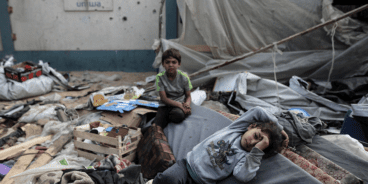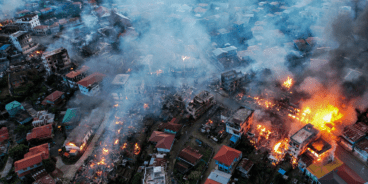
Mounting Evidence of Genocide in Myanmar (Burma)
Almost seven months after the military’s so-called “clearance operations” began, there is mounting evidence that a possible genocide has been committed against the Rohingya population in Rakhine State, Myanmar (Burma). Since 25 August last year the Rohingya have endured widespread and systematic attacks by Myanmar’s security forces, including mass killings, rape, torture, and forced displacement. At Gu Dar Pyin, Inn Din, Tula Toli and numerous other villages deliberate massacres have been perpetrated. Satellite evidence and eyewitness testimony reveal that more than 360 Rohingya villages have been burned down, forcing more than 688,000 Rohingya civilians to flee. An estimated 900,000 displaced Rohingya are now living as refugees in Bangladesh.
Atrocities committed since 25 August appear to have been undertaken with intent to target and destroy the Rohingya as a group, based upon their ethnic and religious identity. These acts include those prohibited under Article II of the Genocide Convention, namely killing members of the group; causing serious bodily or mental harm to members of the group; and deliberately inflicting on the group conditions of life calculated to bring about its physical destruction in whole or in part.
Today, 13 March, the UN Special Adviser on the Prevention of Genocide, Adama Dieng, completed a six-day visit to Bangladesh, where he visited Rohingya refugee camps. Mr. Dieng commented that, “All the information I have received indicates that the intent of the perpetrators was to cleanse northern Rakhine state of their existence, possibly even to destroy the Rohingya as such, which, if proven, would constitute the crime of genocide.” On 9 March the UN Special Rapporteur on the situation of human rights in Myanmar, Yanghee Lee, similarly stated that systematic attacks on the Rohingya community “bear the hallmarks of a genocide.” The UN High Commissioner for Human Rights, Zeid Ra’ad Al Hussein, has also emphasized that “acts of genocide may well have taken place” in Myanmar and has called for the situation to be referred to the International Criminal Court.
Recent atrocities against the Rohingya follow decades of institutionalized persecution of this distinct Muslim ethnic minority group of approximately 1 million people, including denial of citizenship as a result of discriminatory laws, involuntary confinement to displacement camps, and severe restrictions on their freedom of movement, marriage, and reproductive rights, as well as access to employment and education. Rohingya civilians have experienced lives of segregation and intense discrimination, enduring a unique form of apartheid.
Authorities in Myanmar have not only failed to hold those responsible for atrocities committed against the Rohingya accountable for their actions, they deny that any crimes have taken place. The government continues to block access to northern Rakhine State for media, human rights monitors and independent investigators. There have been recent reports of the government bulldozing mass graves and the remains of Rohingya villages in order to hide potential evidence of atrocities, seize land and redevelop Rakhine State without the Rohingya.
Fourteen of the current members of the UN Security Council, as well as Myanmar, are state parties to the 1950 Convention on the Prevention and Punishment of the Crime of Genocide. Yet, despite mounting evidence that a genocide has taken place, the UN Security Council has still not adopted a single resolution on Myanmar.
The Security Council must uphold its responsibility to protect and take urgent action to halt atrocities against the Rohingya. The Council should impose an arms embargo on Myanmar and targeted sanctions on senior members of the security forces, including Commander in Chief Min Aung Hlaing and senior commanders overseeing so-called “clearance operations” in Rakhine State. A resolution should also demand immediate access for UN representatives and independent investigators to Rakhine State, including the Special Rapporteur on the situation of human rights in Myanmar and members of the Fact-Finding Mission mandated by the Human Rights Council. The Council should also refer the situation in Rakhine State to the International Criminal Court.
The broader international community must also uphold their responsibility to protect the Rohingya. All UN member states should take immediate bilateral action regarding mass atrocities committed in Myanmar, including by imposing targeted sanctions against those responsible, suspending all military training programs, and reviewing all aid and development programs in Rakhine State.
The international community has failed to prevent a genocide from occurring in Myanmar. It must not fail to halt ongoing atrocities, protect Rohingya refugees, and punish the perpetrators.
Related Publications


